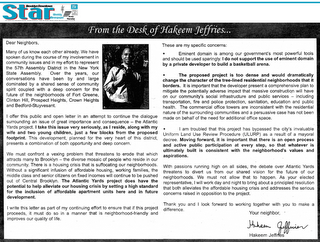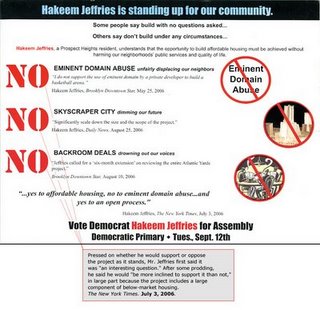 So what does Hakeem Jeffries, the fundraising frontrunner for the open 57th Assembly District seat, really think about Atlantic Yards? His web site is silent. An ad he placed in the Downtown Brooklyn Star in May (right) was muddled, critical in many ways, but unclear on whether he was ultimately pro or con. And since then he has only made his bottom line more confusing.
So what does Hakeem Jeffries, the fundraising frontrunner for the open 57th Assembly District seat, really think about Atlantic Yards? His web site is silent. An ad he placed in the Downtown Brooklyn Star in May (right) was muddled, critical in many ways, but unclear on whether he was ultimately pro or con. And since then he has only made his bottom line more confusing.The ambiguity of Jeffries' Atlantic Yards position places him in between rivals Freddie Hamilton, a supporter of the project and a signatory/beneficiary of the Community Benefits Agreement, and Bill Batson, a staunch opponent of the project, though Jeffries' latest statements show him trying hard to encroach on Batson's constituency. The new Assemblymember, who will succeed project proponent Roger Green, will have a chance to influence Assembly Speaker Sheldon Silver, whose vote on the Public Authorities Control Board--the final step for this project--killed the proposed West Side Stadium.
Leaning toward support
A 7/3/06 article in the New York Times, headlined Atlantic Yards, Still but a Plan, Shapes Politics in Brooklyn, provided the clearest view:
Pressed on whether he would support or oppose the project as it stands, Mr. Jeffries first said it was "an interesting question." After some prodding, he said he would "be more inclined to support it than not," in large part because the project includes a large component of below-market housing.
And the endorsement Jeffries received from the Working Families Party--which was founded by ACORN and which has office space one floor away--hints that the candidate won't deviate too far from the interests of ACORN, Forest City Ratner's prime partner in the Atlantic Yards project. [Update: Maybe we shouldn't read as much into that endorsement. As noted in the comments, the Working Families Party is officially neutral on the Atlantic Yards project.]
More importantly, Jeffries has the support of the Rev. Al Sharpton and many Brooklyn Democratic Party pillars, as well as contributions from unions such as the Carpenters--all supporters of the project.
At CB 2
Jeffries impressed, surprised, and frustrated attendees at the August 3 meeting of Community Board 2, one of three simultaneous meetings community boards held on the Atlantic Yards issue. The transcript:
Let me just thank the community board for your leadership on this issue, and having this opportunity for the community to publicly comment on this important issue that’s affecting us. As Sen. Montgomery knows, there’s a lot of dysfunction in Albany, a deal of dysfunction with state government.
The public authorities are in desperate need of reform… The first place to start was with the Metropolitan Transportation Authority, until this report was issued. And then I realized that if we’re going to reform the public authorities we really need to start with the Empire State Development Corporation.
It really boggles the mind that you could issue a flawed report, endorse a flawed project as a result of a flawed process. And I say that, you know, it’s a flawed report for any number of reasons. And I haven’t been able to make my way through it but what I’ve read, and others who have studied it, it’s clear that it fails to address the most important aspect of this project, which is the serious impact that bringing in an additional 20,000 people into a small Prospect Heights community is going to have on the public infrastructure and the public services.
And how can you issue a report without comprehensively addressing the fact that this type of project will have a dramatic and adverse impact on public education, on fire and police protection, on sanitation, on traffic and on transportation. It’s a flawed process for reasons that have been articulated by folks here today and I’ve spoken about this publicly and I join with the community board if they’re going to move forward and try to address this.
You can’t simply have two hearings, one of which you schedule on primary day, and the other which you schedule in late August. Now I know as a parent of two children that many folks from our community go away in the last two weeks in August. So these hearings have been scheduled in a way to minimize public input and to minimize the opposition, and I think we should call on a moratorium of the process moving forward, and an extension of at least six months so there can be real community impact.
And finally, let me just imply say, in terms of the flawed nature of the project, eminent domain is the most sacred power that the government can exercise and it can only be exercised in limited circumstances. And I’ve said it before and I’ll say it here today that this project should not move forward using eminent domain for a private developer to build a basketball arena.
This led to applause, as well as questions of whether, forced to choose between a pro or con position, which way he'd lean.
Eminent domain?
But what if eminent domain supported affordable housing?
In July, I questioned him. “What’s important to have happen is to see whether the developer can make the case that there's an absolute and explicit and necessary connection between an arena and the housing,” he said. "The eminent domain, in my understanding, is what's necessary as a result of the arena, not as a result of building the housing along the railyards."
I suggested that eminent domain would be used for both the arena and housing. "That's something I would be interested in looking at, but I've got to see that information," Jeffries said.
He should have done so by now. The housing would not be limited to the railyards, and properties beyond the arena block would be subject to eminent domain.
Jeffries' bottom line?
Given this backdrop, I recently queried Jeffries' campaign, asking for any amplification of the oral statement and the statement to the Times. I also asked the bottom line question: "Are you for or against the project as currently proposed (and that includes some implied smallish reduction in scale)?" And I asked if he'd clarify his position on his web site.
 I got the following quick response from People for Jeffries:
I got the following quick response from People for Jeffries:Thank you for your email. The campaign is currently gearing up its Get Out the Vote operation. Hakeem's position on the proposed Atlantic Yards project is clear. We encourage you to refer to the many public statements Hakeem has made regarding this issue to the media, and at two public debates, as well as the open letter to the community placed in Brooklyn Downtown Star several months ago.
Shortly after I got the response, a Jeffries mailer (above; click to enlarge) was sent to voters, and it continued to muddy the waters. He's against "the private abuse of eminent domain," but that doesn't mean he's against "the private use of eminent domain." And it doesn't say where he thinks that Atlantic Yards project would fit.
Jeffries' ambiguous stance is politically understandable. Similarly, 11th Congressional District candidate David Yassky's web site ignores Atlantic Yards. Like Yassky, Jeffries is a smart lawyer. (Unlike Yassky, Jeffries has a longer history in his distict.) Ambiguity may be a prudent political tactic. But it can also make a lot of people wonder.
Further obfuscation
 As the election approaches, another mailer has appeared, according to Atlantic Yards Voter Guide. "No eminent domain abuse unfairly displacing our neighbors," it says. "No skyscraper city dimming our future. No backroom deals drowning out our voices."
As the election approaches, another mailer has appeared, according to Atlantic Yards Voter Guide. "No eminent domain abuse unfairly displacing our neighbors," it says. "No skyscraper city dimming our future. No backroom deals drowning out our voices."In the gray box, AYVG adds--for clarity--Jeffries' statement to the Times that he'd be more likely to support the project than not. The ad doesn't say how big the project should be, as AYVG points out, or why a six-month extension would cure the process problems, and it sets up a false dichotomy between project supporters and those who want nothing built.
Frankly, when I first saw this obfuscatory flier, I thought it was a parody of some sort. But I don't think so.
To be clear, the Working Families Party is neutral on the Atlantic Yards project.
ReplyDelete